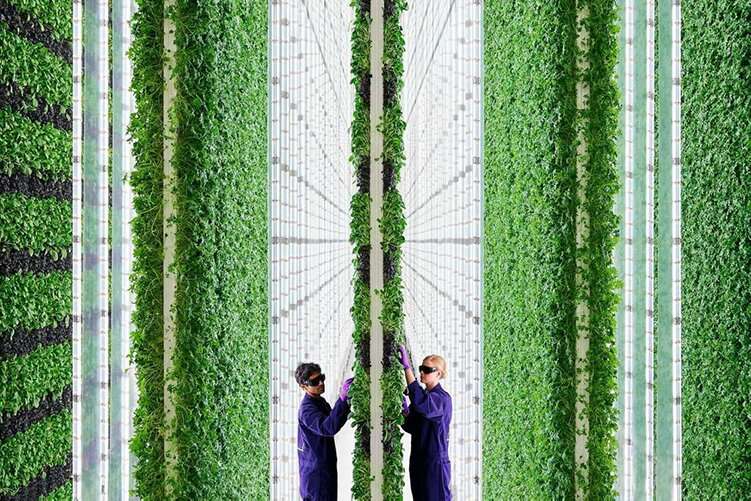Credit: Plenty
When you think about it, early civilizations had a rough time when it came to dinnertime. With no supermarkets, McDonald's, or Cheesecake Factories, you pretty much had to find and prepare your own meal every day. And since Uber would not be invented for another 14,000 years, primitive peoples around 12,000 BC had to walk, sometimes for miles, and learn to hunt, fish, gather and cook for their daily meals. In the rain. Even on Sundays.
Farming evolved quite a bit since then. But with a world population hurtling towards 8 billion, we face a problem. As the 18th century economist Thomas Malthus observed, human population increases geometrically, while food production increases only arithmetically. That means the more civilization grows and thrives, the more likely it will be unable to keep up with demands for food.
While advances in food technology have helped forestall Malthus' dire predictions, there remains great concern for the future of food production as the Earth's population soars on a planet with shrinking farming real estate. National Geographic recently predicted that by 2050, there will be more than two billion additional mouths to feed while the Earth's irrigable land remains essentially the same.
A San Francisco agricultural-technical startup thinks it might just have an answer. Nate Storey, who co-founded the appropriately named Plenty, wants to reinvent farming.
To do so, he has constructed climate-controlled vertical farms that are so promising, they have drawn $400 million in funding from former Google Chairman Eric Schmidt, Amazon's Jeff Bezos and SoftBank.
These upright farms take up only 2 acres yet produce 720 acres worth of fruit and vegetables. Lighting, temperature and watering are controlled by AI-controlled robots. Sunlight is emulated by LED panels, so food is grown in optimal conditions 24/7. And water is recycled and evaporated water recaptured so there is virtually no waste.
The operation is so efficient it uses 99 percent less land and 95 percent less water than normal farming operations.
"Imagine a 1,500-acre farm," Storey says. "Now, imagine that fitting inside your favorite grocery store, growing up to 350 times more. That's efficient."
It is so efficient that these rows of hanging plants produce 400 times more food per acre than a traditional farm.
AI monitors growth patterns and constantly adjusts environmental factors such as temperature, water and light patterns to ensure ever-more efficient and economical output.
In an era that has seen food production lines disrupted by a pandemic, wildfires and hurricanes, Plenty's approach will play a key role in ensuring future stability in the food chain.
Plenty's web site explains vertical farming "free agriculture from the constraints of weather, seasons, time, distance, pests, natural disasters and climate."
Also noteworthy is that the crops are grown "GMO-free" and use no pesticides or herbicides, according to Plenty.
Plenty will soon supply more than 400 stores in California with its produce. The company says its packaging is specially designed to keep produce fresh longer and is 100 percent recyclable.
In October, Driscoll's, a leading producer of fresh berries, reached an agreement with Plenty to produce strawberries year-round in its Laramie, Wyoming-based farming operation, currently the largest privately-owned vertical farming and research facility in the world.
The Plenty website lists several products currently offered in stores, including lettuce, arugula, bok choy, mizuna and kale.
If the first civilizations to invent farming back around 12,000 BC only had the convenience of vertical farming, maybe they could have saved 8,000 or so years by spending more time working on inventing the wheel. And ear pods.
More information: www.plenty.ag/about-us/
© 2020 Science X Network
























